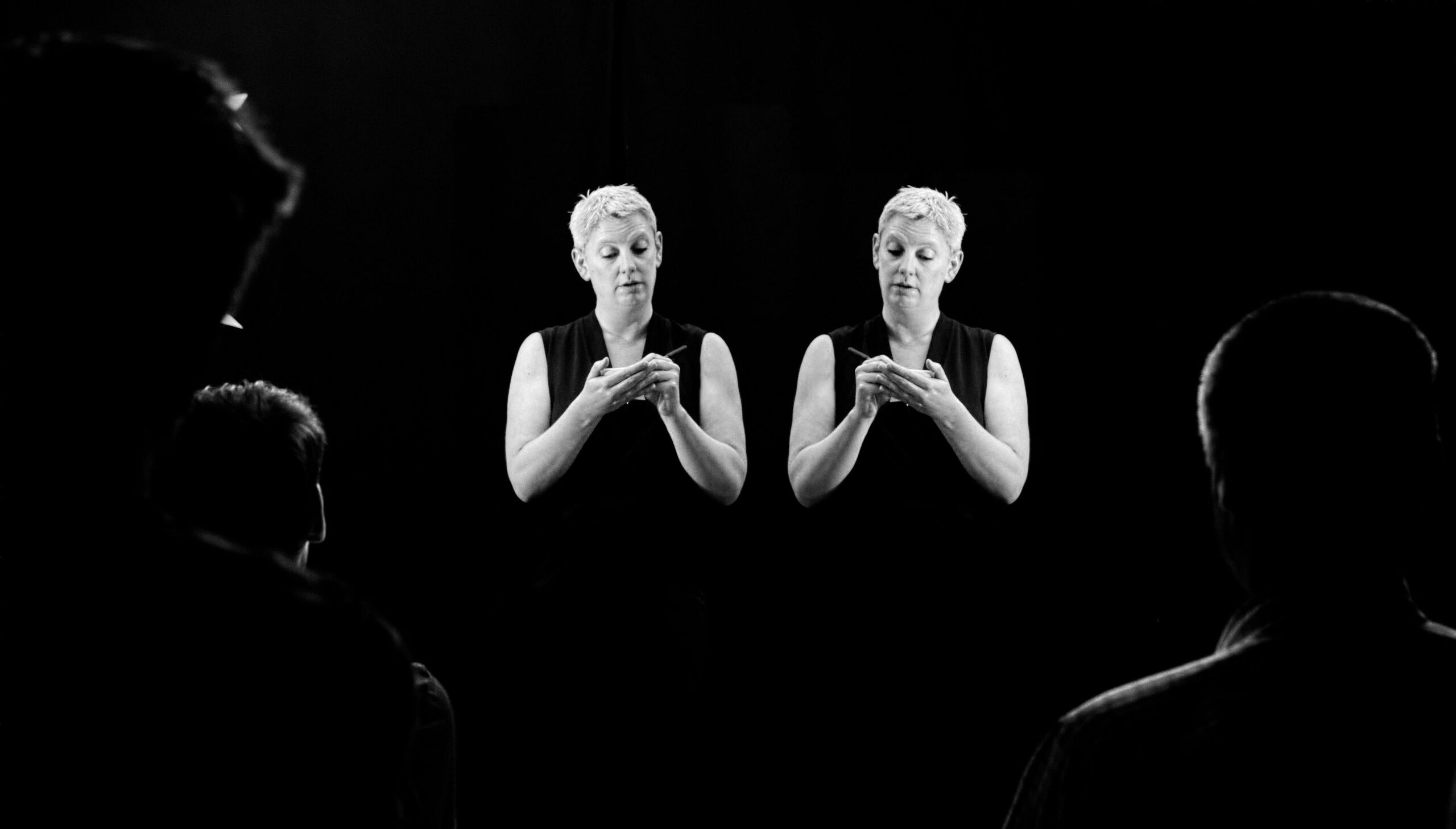THOUGHTS, IDEAS, QUESTIONS, PROCESS, LESSONS,
Student Post
Hearing myself think
Cindy Pittens – Week 3
Interview yourself.
That was this week’s assignment.
That became a vulnerable interview.
It gives a glimpse into my personal process and all the questions and uncertainties that come with it.
Quite a bit exciting. But also nice to share.
Maybe you recognize something of yourself or other players, or your participants? Maybe you recognize something in the people around you. I think we all know these voices. The voice you’re not proud of. I think it’s important that we see that it’s all part of being human. Just a glimpse into Cindy Pittens’ busy inner kitchen.
 i. How do you feel?
i. How do you feel?
c. Not so good.
i. How come?
c. Not sure.
i. Tell me what exactly you feel then.
c. I am afraid to tell you.
i. Why?
c. I think you don’t have the patience or the interest to listen
i. You could give it a try?
c. I feel like you are trapping me, and when I will tell you, or even start my story, you will refuse and ignore me. You will not accept my story as an honest or true story. You will disregard my feelings and words. You will be distracted by something more fun. You will be harsh and put it on improv skills. So that gives you permission to be cold and uninterested. You are not my therapist. You made that very clear.
i. Maybe if you would keep it elegant?
c. Fuck you.
i. Why would you say that?
c. Because it’s not elegant that lives inside of me. It’s messy and confusing. I don’t have the right words. As soon as I have the words, I lose contact with what I feel. You don’t want to know my messy, ugly side. The only thing you want is a slick improviser, happy with failing, happy with themselves. I am not happy. I don’t like failing, because there is not enough faith in what will remain, is enough. It is not enough. The world has told me many times.
i. What if it was enough? What if the world was wrong?
c. It’s not. You keep telling me it is, but your behaviour, when it comes to it, tells me different things. When I am … never mind.
i. What happened? Why don’t you end your sentence?
c. Because I am scared. I feel judged. I hate my own crying. I hate and am tired of feeling sorry for myself.
But I am the only one who seems to understand what I am going through. Even wants to understand. I feel alone and left alone.
i. What do you think other students feel? You don’t think they are confused and frustrated as well? Do you think they feel capable and relaxed? Disappointed in their capabilities?
c. I think they feel the same things, at other moments…
i. And there you go… pushing their faces in the mud even more – for example: when one of your classmates was struggling.
c. Yes. I did. I am ashamed about that. I feel ridiculous about it as well. Why would you do that?
…I did it. It came from a mixture of not being able to understand that someone is so far away from feeling and curious how we could fix that… and I felt superior and wanted to feel that supremacy even stronger… I think… I am not sure. I might be that nasty person.
i. You are feeling sorry for yourself. You put yourself in the spot of sadness. Why not just see it and think: That wasn’t nice. Apologize and move on?
c. I did that. That was my perfect behaviour. But inside it leads to another life. Things get stuck. Bad feelings grow, as I don’t name them. I can’t vent them. I am behaving correctly, as far as I can. But inside I am a mess. I don’t think this is the way I should take care of myself. But I feel forced into this direction. I didn’t really realize it until now. I am writing and all the dirt is coming out. I tried to give it less attention, last week, but it just piles up inside. Maybe I am not ready for this.
i. You maybe are not.
c. You think?
i. What do you think?
c. I am ready. I am just having a little breakdown. Or a bigger one. I don’t know. (little smile breaks through)
i. I thought you wanted to join drop-in class at the Kinkonauts?
c. Yeah.
i. You have to go and prepare yourself. You look like sh#t.
c. …Yeah.
i. Nou, hup dan.
PART TWO
i. How are you today?
c. Better, thank you
i. Shall we start over?
c. Yes.
i. What did you come here for, all the way to Canada from the Netherlands?
c. To learn how to Improvise devotedly and with ease. I need to save energy in doing my work as an improv teacher and player, otherwise, it’s not sustainable. And I want to enjoy it more.
i. Do you think you will find it here?
c. I think I could. It depends mostly on me and my willingness and trust to let go of certain automatic responses. I think I am handed the tools to do it. At least… these tools… I am not sure yet if they’ll work for me. But I am definitely willing to try it.
i. What tools are you talking about, and how would they work?
c. It’s about finding detours in your brain, by altering the speed of play. In this case, with Johnstones’ method, most of the time, speed it up. I am familiar with slowing down, to feel safe, but in many situations, that is not what is asked for.
When I am in charge, I can slow down. But many times I feel myself surrendering to the person who leads or surrendering to the circumstances. I don’t have much control over myself in those situations. So I don’t slow down. I go along with the given speed, but my anxiety is creating an inner fight that exhausts me.
i. How would speeding things up, then help you? Shouldn’t you be practicing slowing down, regardless of the circumstances? Learn how to stay with and listen to your own needs.
c. That is a good question.
i. Thanks, me! For giving me that compliment.
c. I am welcome.
I think both tools are reached out by Shawn. Always the two sides of the coin. Step back, take care of yourself, when you need it. If you take care of yourself, you take care of the scene and your scene partners.
On the other hand, there will be many situations, where I need to speed up to keep it interesting. To be able to tell a good story, not restricted by an inner anxious critic. To be able to stay connected to my partners at a higher speed. I want to be able to endure a higher level of ‘healthy’ stress, without shutting down or having to take a step backwards.
And what I do here is exercise my brain and body to do that. 20 hours a week we practice improv in different ways. And most of it, is high-speed, fun-failure exercises. Exercises that trigger my nervous system, telling me this is UNHEALTHY stress.
i. If your body tells you, this is unhealthy? Why would you not believe it?
c. Good question again. This is the hard part of it.
My life has been not easy. For the last 10 years, I have been working myself up, from a dark place to a much lighter one. One of the most important things that helped me get here, was starting to listen to myself. To my body. To stress symptoms and act on them. Calm down. Take rest. Slow down. Take care of yourself. Take small steps. Set and communicate boundaries.
I am not there yet completely, but better than I’ve ever been.
i. So.. this kind of saved your life? Why would you even consider it, to change then?
c. Now, that is the opposite approach. Yes, listen to your body, but also understand, that it is not always right. I AM safe. There is no REAL threat. My trauma-informed body is not always right.
What if I could rewire my brain/nervous system to a new setting? Let’s call it a reset.
If I submit myself to numerous situations/games/exercises where there is actual safety, socially and physically. Where I get triggered by feelings of anxiety, but now, not stepping back (so I confirm that it was unsafe), but stay in and find out, confirm that it was actually safe. I think that’s what I am doing now in this class. The big question is…
i. Are you ready?
c. Exactly. Am I mentally healthy enough to do this? Will I be able to step back, when necessary? And will I be brave enough to enter the scary moments? Without re-traumatising myself. This is a thin line. And I am responsible for it.
i. So these are the only 2 options? Finding a healthy way to speed up and be an improviser? Or what? Not be an improviser?
c. Not sure. Many outcomes are possible.
Maybe this will work out perfectly and after these two months, I have found a new way to improvise!
Maybe I need more time, to practise. More than 2 months, 20 hrs a week might be needed to really reset my 42-year-old brain. I think I will be able to recognize this, after these two months. I’ll know whether I experienced sparks of how it should feel. And when I keep doing this at home, it will help me to get those sparks more often. It will get easier in time.
Another path that might come out, is that I am just not that person. Maybe I am not really that fast. Maybe I need more time to reflect and process all these overwhelming feelings and thoughts. And is the route I set 10 years ago the right one? Learning to calm down, take my time. And are these months the actual ordeal? Can I stay on my path? Or will my ego want me to change into this fast, funny improviser?
Does that mean I am not an improviser? I don’t know. I don’t think so. I can be the improviser with a slower pace. But maybe this will change the goals I’ve set for myself. I’ll figure that out when we get there.
i. Thanks for showing yourself.
c. Thank you, for the space and time. And all the good questions. It was almost as if I heard myself thinking…




0 Comments